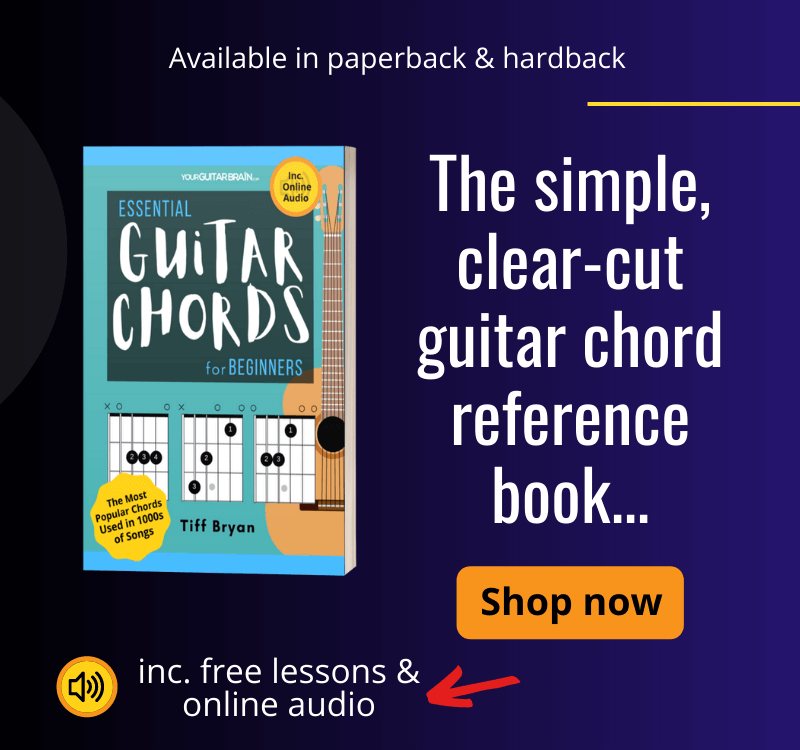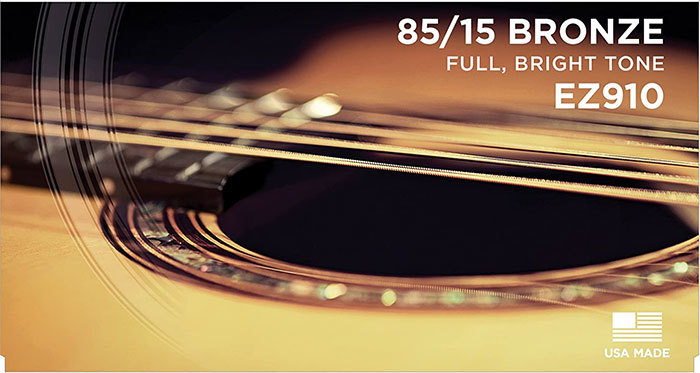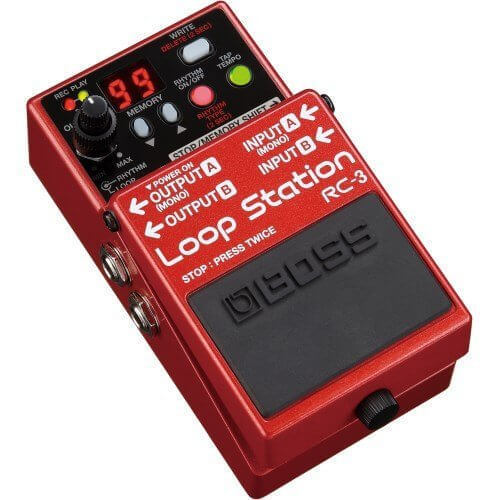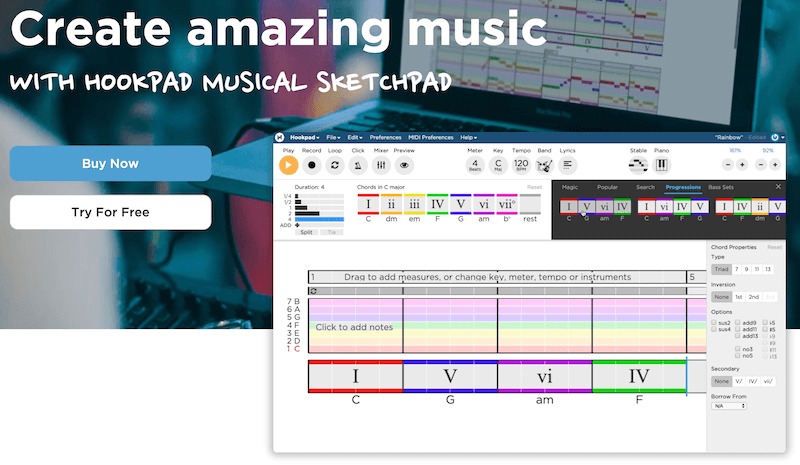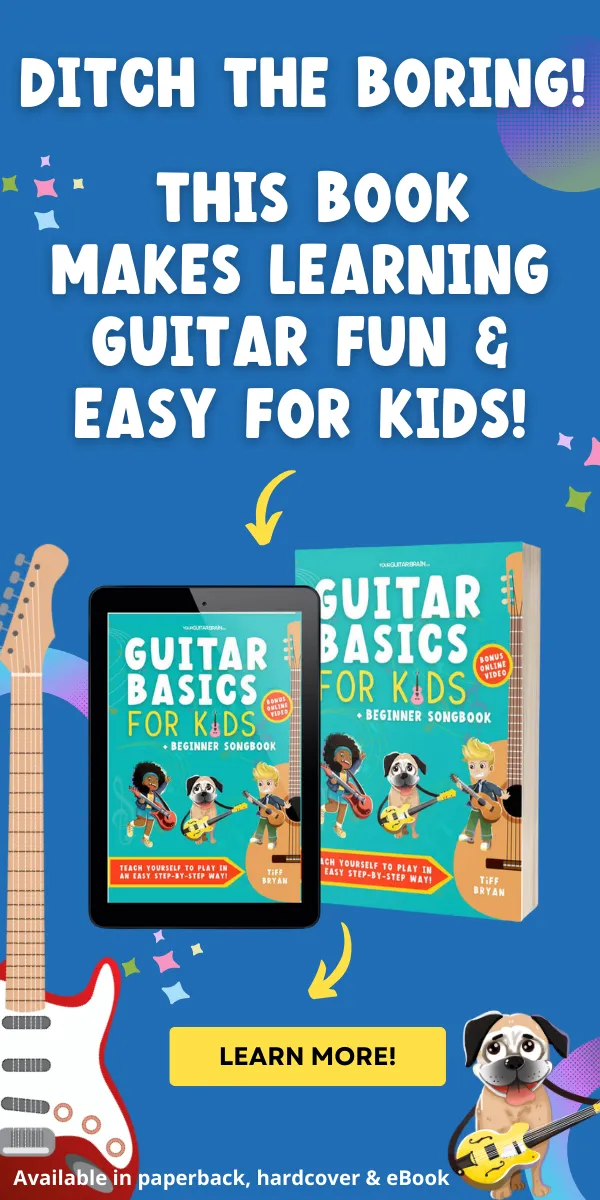Beginners – Before you start learning to play guitar, there are 13 things you need to know. Avoid making common mistakes and learn the secret to guitar-playing fulfilment!
Are you ready to learn to play guitar? If you are, you want to make sure you start off on the right track.
This will help you avoid a lot of wasted time and hassle, have more fun, and achieve a great level of playing ability.
In this article, I will reveal to you 13 things you need to know before you start to learn guitar. These tips will save you crazy frustration and make your learning journey much smoother.
Even if you already play guitar, you might also discover some helpful hints here.
So let’s get to the 13 must-know beginner guitarist tips!
1. You need to choose the right guitar
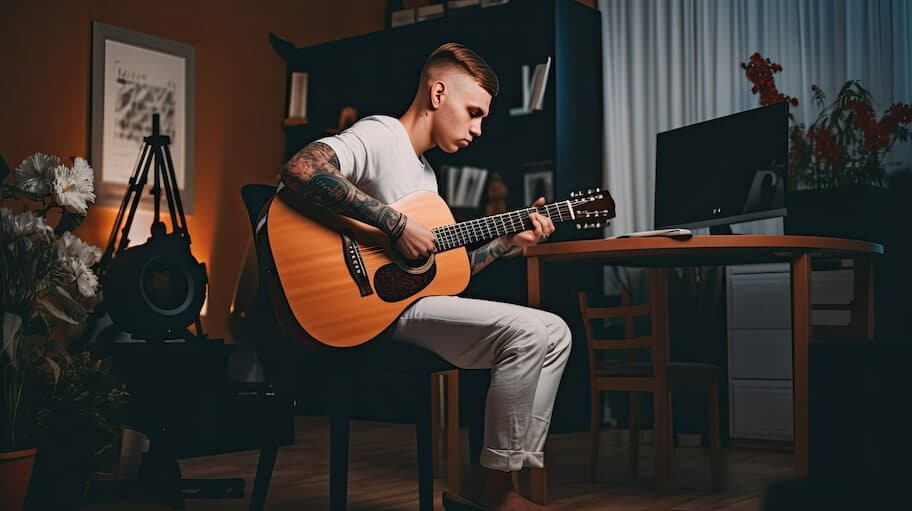
One of the most common questions that beginner guitar players ask is: should I learn on an acoustic or electric guitar? The answer is…
…you should start on an acoustic guitar. No doubt about it.
This is because learning on an acoustic guitar will give you a huge advantage over those who start on an electric guitar.
Why?
One reason is that acoustic guitar strings are thicker than electric guitar strings, which means your fingers will get stronger faster, helping you develop better control and technique.
Here’s another way to look at it:
Acoustic guitars are also much more convenient to play than electrics, as you don’t need to worry about buying the best guitar amp and cables.
Too many guitar players get distracted by gear (that they often don’t use), while an acoustic helps you keep it simple and focus on the important stuff – learning to play guitar well.
Don’t fall into the trap of learning on an electric guitar because you heard it “doesn’t hurt as much as an acoustic,” as this is not necessarily true.
However, if you feel an acoustic guitar isn’t your jam for any reason, such as preferring heavy metal music, feel free to opt for an electric guitar. Ultimately, the choice is yours.
Further reading: 10 Brilliant Cheap Acoustic Guitars | 10 Brilliant Cheap Electric Guitars
Pro Tip
If your heart is set on getting an electric guitar, reward yourself with buying one once you've reached a predetermined playing milestone.
2. Learning to play guitar is not pain-free
When you learn to play the guitar, your fingers are going to hurt.
There. I’ve said it.
And just like any new physical skill, your body will need time to adapt to it. Many guitar players wish they had been warned before they started learning how sore their fingers get at the beginning.
You’ve heard of famous guitarist calluses, right? Well, you’ll get these hard areas of skin on your fingertips the more you practice your guitar. This means playing will hurt less over time.
But here’s something that not many people tell you…
It’s not just your fingers that get sore. Be prepared to feel it in your hands, arms, and even your neck if your posture isn’t good.
The happy news is, that by using a comfortable ergonomic chair and a footstool accessory, you can prevent aches while playing the guitar.
And those sore fingers? The more you practice, the faster they’ll be pain-free. Just keep at it and you’ll see.
3. You have to tune your guitar every time you play
There’s nothing worse than hearing someone playing an out-of-tune guitar. Yuck. It’s like the sound of nails on a chalkboard, it’s not a sound anyone likes.
So what’s the solution?
Get into the habit of tuning your guitar every time you play it. Because no matter how well you’re playing that G major chord, it’ll sound awful if your guitar isn’t in tune.
The deal is even slight temperature changes can affect the tuning of guitar strings, but fortunately, you can easily fix this by regularly checking your tuning.
Because we know tuning can be boring, you should get some tools to make it easier and faster. From a cheap and cheerful clip-on guitar tuner to a super cool fully automatic tuner and string winder gadget, you’ll soon master it.
Pro Tip
It's important to properly store your guitar to avoid damage. Avoid leaving it near a radiator, in direct sunlight, or in damp places as this can affect tuning and lead to potential harm.
4. It’s important to regularly re-string your guitar
Do you know that you have to change the strings on your guitar? Many beginner guitar players don’t, but I’m here to tell you: you do.
Here’s why.
Over time, guitar strings lose their brightness and become corroded from dirt and sweat building up on them. As a result, old strings don’t sound good; they’re harder to play and break more easily than new strings.
Now, if you’re wondering how often you should change your guitar strings, the answer is not that simple, as it depends on several factors, such as:
- the brand and quality of strings on your guitar
- how long the strings have been on the guitar
- how often and how long you play your guitar
I suggest you read our comprehensive article The Ultimate Guide to Changing Guitar Strings: Everything You Need to Know, and take the quiz to determine your personal string-changing timeline.
Moreover, there are some things you can do to extend the life of your strings, such as using string-cleaning maintenance kits to keep them in optimal condition for longer.
5. You’ll never sound good on guitar without a metronome
Do you want to learn to play guitar with perfect timing and rhythm? If you do, you need to avoid one of the most common mistakes that many beginner guitar players make: trying to play too fast without using a metronome.
The truth is speed is not your main goal when you start learning to play guitar. Playing in time consistently without speeding up and slowing down is.
The problem is, many self-taught guitar players don’t know this and so waste time focusing on trying to shred at lightning speeds without ever using a metronome.
It’s only ever going to sound like an out-of-time mess if you do this.
What’s the secret to achieving flawless timing and rhythm? Luckily, it’s quite simple: you should use a metronome every time you practice. Whether it’s scales, chord changes, or strumming – always use one.
Before we go any further, you need to understand something else:
The purpose of using a metronome is not just to help you play faster; it’s also to make sure you don’t play too fast too soon.
Plus, using a metronome is a great way of measuring your improvement.
With that being said, from metronome apps to mechanical metronomes, whatever your preference, make sure you have it loud enough so you can sync your playing properly with it.
Bonus Tip: Play along to audio recordings to turbo-boost your playing ability
Another tip in the same vein of using a metronome is to play along with any piece of music you’re working on. Experiment with using software to slow the song recording down to make it easier – try starting at 60% speed.
You might be surprised to find that slowing the music down makes it feel harder to play. This is because you need more control and strength to play perfectly at slow speeds.
This is why most amateur guitar players rush while playing – due to the lack of necessary control and technique to play consistently well.
The key to mastering a song is to gradually increase the speed until you can play it flawlessly at the original song tempo.
6. Your posture will make or break you

Hands up if you’re guilty of slouching back on the sofa when you practice. Stop it, all of you!
Here’s why:
How you sit when you play guitar can positively or negatively impact your playing gains. I’m not joking – proper posture will help you play guitar better.
From standing up to save your back to keeping your fretting arm close to your body – get your posture correct, and you’ll make your practice sessions more productive. Get into good habits early doors.
“Bad habits are much harder to kick than good habits are to form.”
Here are three more tips on how to hold your guitar to achieve good posture:
- Sit up with your back straight, and don’t slouch. You’ll avoid neck and back aches this way. Having the correct chair for your music room is key to good posture.
- When sitting to play, raise your right knee slightly (left knee for lefties) so your guitar sits in a comfortable position. You’ll instantly ease the tension off your fretting hand. Use a guitar footstool to do this.
- Relax your muscles and drop your shoulders. Doing this will help you steer clear of muscle tension, which can cause fatigue and cut your practice session short.
7. Avoid overloading; it derails song learning
If you’re eager to learn any piece of music swiftly, I’m sure you are, but to achieve that goal, you must avoid one of the most common pitfalls beginners often stumble into:
attempting to learn too much too quickly and ultimately giving up.
When learning to play a song on guitar, the key is never tackling it as a whole. Divide it into sections and work on each before moving on to the next.
This will help you:
- Repeat sections numerous times before moving on to the next. When you think you’ve repeated it enough times, repeat it 30 times more!
- Work on memorising song arrangements without the need to read from tablature or chord sheets
- Focus on improving your timing, rhythm and playing songs by ear
- Work on ironing out mistakes in particularly tricky parts
When getting familiar with new shapes (chords, melody arrangements, scales etc.) at first, don’t use a metronome.
I just wanted to clear something up that might seem a bit conflicting with tip number 5:
Rather than getting overwhelmed, it can actually be helpful to take a breather from the metronome and focus on getting the hang of new finger positions and shapes first.
Once you feel more confident with the basics, you can gradually bring the metronome back into your practice routine.
But be warned: Don’t stay in this first phase for too long. Start using a metronome and/or playing along with audio recordings as soon as possible.
This avoids laziness and boosts playing progression by giving you a gentle kick up the butt to help you get out of your comfort zone.
In short – If you want to improve on guitar faster, play along with a metronome, practice backing tracks and song recordings.
Bonus Tip: Use a loop pedal
Another tip to take your learning to the next level as a beginner guitar player is to use a guitar loop pedal. A loop pedal is a device that allows you to record a part of a song and play it back repeatedly.
This way, you can practice different parts of the song over the loop, such as solos, riffs, or chords.
Using a loop pedal will help you:
- develop your ear and musicality
- improve your improvisation and creativity
- have more fun and motivation
You can find many affordable and easy-to-use loop pedals on the market, such as the Boss RC-5, or the TC Electronic Ditto. You can also use software or apps that have looping functions, such as GarageBand or Audacity.
Using a loop pedal is one of the best ways to practice guitar and learn any piece of music in no time. Try it out and see for yourself!
8. You're going to get frustrated at some point

Let’s be honest. Learning any new skill takes some patience, and the truth is sometimes you’re going to get frustrated learning to play the guitar.
Depending on how grounded you are, you may even feel like throwing your guitar against the wall at some point.
Breathe in…and out…
The trick is to remember every mistake you make is one step closer to mastery and you’ll get better if you persevere. Accept the fact that a little frustration is normal.
It’s important to take a compassionate approach towards yourself when you find yourself getting irritated or annoyed. We all experience it at times.
However, it’s equally important to maintain control over your emotions and not allow frustration to dictate your actions.
“It’s all about finding a healthy balance between acknowledging and processing your feelings while still remaining in a calm vibration.”
Remember, kindness and self-control go hand in hand.
If learning to play guitar was easy, everyone would do it, right? The reality is most people let their own fears stop them.
You’re strong. You got this!
And speaking of believing in yourself…
9. Lack of self-belief will suffocate your potential
Do you ever feel like you’re struggling with feelings of self-doubt, worthlessness and anxiety? Do you ever find yourself in negative situations where you think, “Typical, this always happens to me.”
Try not to be one of those people.
You see, when you’re in a downward spiral of failure, your negative mindset affects every part of your life, including your potential to learn to play guitar well.
To put it another way, don’t let your insecurities prevent you from being the best you can be on guitar.
It’s all about this universal law:
“You can only attract that which you resonate in harmony with.”
Would you like to learn about the one common trait among the students I have taught over the years who make the most progress with their guitar-playing abilities?
No, it’s not having long, slender fingers or being born with innate talent. The answer is simple: they don’t allow self-doubt to hinder their progress.
Instead, they understand that belief, hard work and a positive attitude will lead to improvement.
Sure, they get a little annoyed when they find things tough from time to time, but the difference is they don’t let the negative feelings stop them.
Take one step at a time to work on overcoming your insecurities. Be kind to yourself, stand in your power, and you’ll achieve anything you desire on your guitar.
Believe it or not, I had crushing low self-confidence when I started learning to play guitar. I thought getting good on guitar was something ‘other people’ did.
I was so down on myself that I’d stop playing my guitar if I heard someone near my bedroom door where I was practicing.
I was my own worst enemy.
Luckily, in time, I saw the light. I started to be less hard on myself.
I discovered life-changing ideas like the Kaizen Method and the 80/20 Principle. And you, like me, can make your guitar skills progress quickly when you start to believe in yourself – I promise you’ll get there if you follow this advice.
10. It takes time to be able to play guitar and sing at the same time

Do you want to play guitar and sing at the same time? If you do, you need to be realistic and patient. It’s not an easy skill to master; it will take some time and practice.
I’ve often been asked by students, “Why am I finding it so hard to play guitar and sing at the same time?” My answer is always a question: “Can you play the whole song on its own four times in a row 100% perfect?”
Their answer is always: “Umm…No”.
If you’re a beginner guitar player, it will take many hours of practice to be able to play a song ‘performance perfect’. Your brain is getting used to new chords, strumming rhythms, picking patterns, techniques, etc.
Don’t expect to be able to add another thing to think about (singing) before you’re ready.
Take your time and work up to it. It may be a relief to know that there are clever methods you can use to help you develop the skill of singing and playing simultaneously, which we will cover in another article.
10. To avoid hitting a brick wall, you need to have a structured practice routine
The simple habit of filling in a practice schedule is another secret weapon to guitar success. And it’s not just something that newbie guitar players should do, but also players who’ve been at it for years.
This is one reason why people who play the guitar often hit a brick wall playing the same old stuff week in and week out.
Interesting fact: According to an article on Inc.com, you’re 42% more likely to achieve a goal if you write it down. When we practice the guitar, we’re simply working towards achieving mini goals.
Be it getting rid of the buzz on the top E string on the A major chord or nailing that Mixolydian mode solo.
The takeaway from this tip is to make your next practice session less stressful and more productive – fill in a practice planner before you pick up your guitar.
According to productivity guru and life coach Brian Tracy, you’ll benefit the most when you prepare for the following day’s work (practice) the evening or the night before.
“Not planning out your practice sessions results in wasted time, procrastination and slow progress.”
Your playing improves faster when you have a clear, written plan. You can be as detailed or brief as you like – simple bullet points highlighting the areas for you to practice will do.
You could use a note-taking app on your smartphone or tablet or opt for a good old-fashioned paper notepad and pen.
Whichever you choose, don’t just wing it next time you sit down to practice – use a practice planner.
👉 Grab a free guitar practice planner PDF on us here. (But finish reading this awesome article first, of course!)
12. Take care to avoid bad teachers
All guitar teachers are not created equal.
Take people teaching you how to play guitar online, for example. There are some fantastic players on YouTube showing you how to play things, but sadly, there are some not so good ones, too.
Look at it this way: being a good guitar player doesn’t mean you’re automatically going to be a good teacher.
You need unique communication, organisational and emotional skill sets to be able to teach someone how to play an instrument correctly.
“Being a good guitar player doesn’t mean they’re going to be a good teacher.”
Moreover, it can kill your gains on guitar listening to all the conflicting advice. You’ll develop bad habits and poor technique if you’re not careful and don’t follow the right advice.
Inadequate guitar tutor tales
There are plenty of horror stories online from real guitar players who have been taught by incompetent tutors. I’ve also heard my fair share of hair-raising tales from my own students.
For example, one student told me about a teacher who hadn’t taught her any chord shapes after 18 months of lessons (and this teacher was through her school, too!).
Another student said that their teacher handed them a thick wad of tablature printouts on their first lesson and told them to go away and learn it all.
So, If you’re considering taking guitar lessons, be sure to research and choose a qualified, experienced teacher with a good reputation.
When looking for a guitar tutor, look for one who is a:
- Highly experienced teacher with lots of good genuine reviews and student testimonials for you to check out.
- Professional musician with plenty of performance experience (live and recording) – and not just a hobby bedroom player.
13. You need to listen to yourself

To strengthen your weaknesses, you first need to identify them. And to identify your patchy areas on the guitar, you need to hear (and see) them.
Don’t just guess if you’re getting it right – take constant progress recordings to actually know if it’s right.
With today’s technology, there is no excuse not to use your preferred device. If we’re blessed enough to have the financial means, we have plenty of options.
Recording clips throughout your practice sessions allows you to be your own teacher and give yourself constructive feedback, which helps you to improve faster.
It also gives you an opportunity to give yourself a pat on the back when you hear (and see) your improvement over time.
“You can only improve something if you know it needs improving”
Recording progress clips is a piece of advice I repeat daily to my students. And you know what I’ve noticed? Students who progress the fastest are the ones who take that advice on board.
They also seem to enjoy playing more than the ones who don’t take the time to record themselves.
Because being good on guitar requires a great ear for things such as timing, rhythm and feel, you can only perfect these skills properly by listening to your own playing.
Summing it up
So there you have it: 13 things you need to know before learning the guitar to avoid tripping yourself up.
These tips will help you save time, money, and frustration, making your learning journey more enjoyable and rewarding.
Remember, learning the guitar is not a sprint but a marathon. You need to be patient, consistent, and motivated. And most importantly, enjoy your journey!



